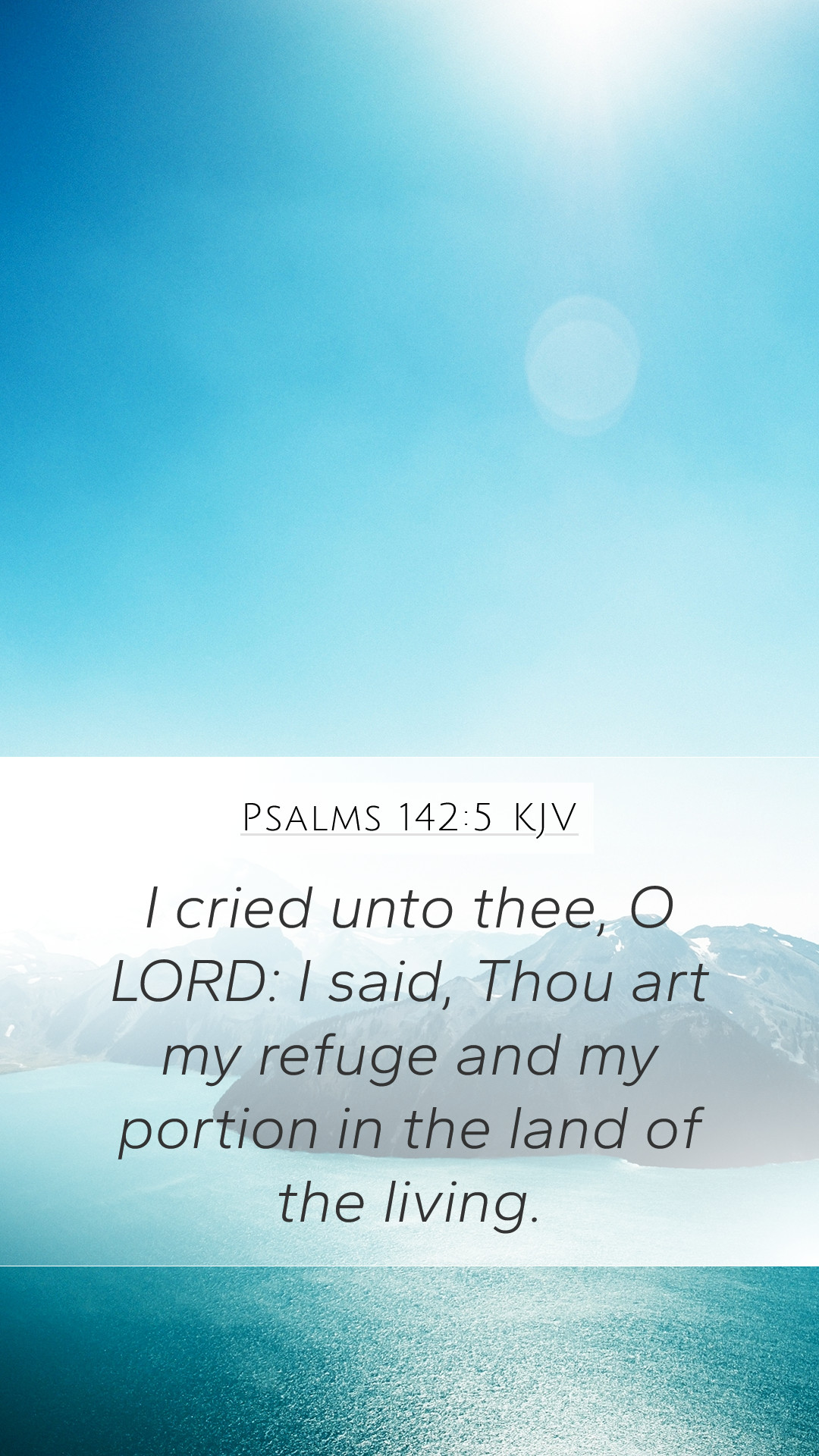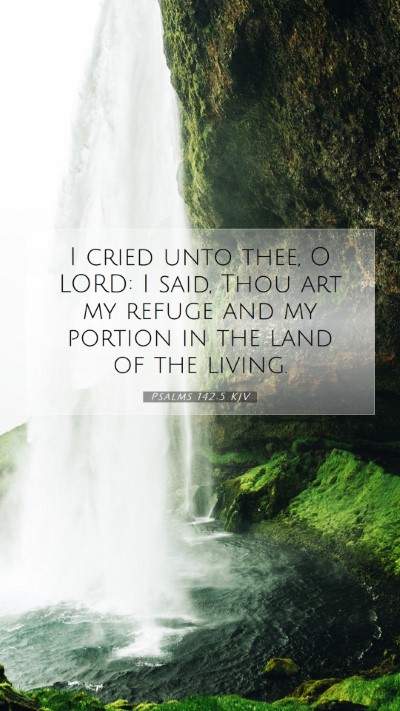Bible Verse Meanings: Psalms 142:5
Psalms 142:5 states, "I cried unto thee, O Lord: I said, Thou art my refuge and my portion in the land of the living." This verse encapsulates a profound expression of despair, hope, and reliance on God. Here, the psalmist clearly articulates their state of distress while simultaneously affirming their trust in the Lord as their chief supporter.
Contextual Overview
The context of this verse is essential for understanding its full meaning. Psalm 142 is attributed to David when he was hiding in a cave, hunted by Saul. This situation of isolation and fear prompted an earnest cry to God for help. This psalm exemplifies a deep sense of vulnerability juxtaposed with an unwavering faith in God's provision.
Interpretation from Public Domain Commentaries
-
Matthew Henry’s Commentary
Henry emphasizes the significance of the psalmist's appeal to God as a refuge. He notes that while faced with dire circumstances, the psalmist seeks God's shelter from the adversities of life. Henry also highlights that the phrase 'my portion' indicates a personal relationship with God where the psalmist finds fulfillment and sustenance, signifying that true satisfaction comes from God alone.
-
Albert Barnes’ Notes
Barnes elaborates on the meaning of 'I cried unto thee, O Lord,' pointing out the intensity and urgency of the psalmist's plea. His use of the term 'portion' suggests that God is not merely a refuge but the source of spiritual inheritance. Barnes emphasizes that this acknowledgment encourages believers to trust in God’s ongoing provision and care, especially during life's troubling moments.
-
Adam Clarke’s Commentary
Clarke describes how the psalmist’s declaration serves both as an assertion of faith and a reminder of God’s omnipresence. Clarke notes that here, 'the land of the living' connotes a hope that goes beyond this earthly life, suggesting an expectation of divine intervention in the believer's current situation. Clarke's insights reflect the larger biblical theme that God provides hope and sustenance beyond mere mortal existence.
Understanding the Themes
- Despair and Cry for Help: The expression of crying out to God demonstrates an honest admission of distress. This resonates with anyone feeling overwhelmed, reflecting that seeking God in times of trouble is a deeply ingrained practice in biblical spirituality.
- God as Refuge: Calling God a 'refuge' signifies a sanctuary in times of turmoil. This metaphor reinforces the assurance that believers can find safety and comfort in their faith amid life's storms.
- Divine Portion: The imagery of God as 'portion' signifies that God alone is sufficient for the believer’s needs. This notion extends beyond material wealth to encompass emotional and spiritual well-being, encouraging deeper reflection on what truly sustains life.
- Hope in the Land of the Living: The phrase suggests a hope that transcends this life, encouraging believers to look forward to a fulfilling spiritual inheritance, enhancing the understanding that God’s promises endure beyond earthly struggles.
Application of Psalms 142:5
Believers can incorporate the lessons from this verse into their daily lives through various means:
- Incorporating Prayer: Regularly crying out to God forms a fundamental part of maintaining a vibrant spiritual life, mirroring the psalmist's approach.
- Seeking Refuge in Scripture: Engaging with biblical texts serves as a refuge and brings comfort and guidance.
- Community Support: In challenging times, leaning on community, such as Bible study groups, can provide the necessary support to see through difficulties.
- Reflecting on God's Provision: Reflecting on times when God has provided can reinforce faith and instill hope that He will continue to do so.
Cross References
- Psalms 18:2 - "The Lord is my rock, and my fortress, and my deliverer; my God, my strength, in whom I will trust."
- Psalms 31:7 - "I will be glad and rejoice in thy mercy: for thou hast considered my trouble; thou hast known my soul in adversities."
- Psalms 73:26 - "My flesh and my heart faileth: but God is the strength of my heart, and my portion forever."
Conclusion
Psalms 142:5 serves as a powerful reminder of the importance of seeking God in times of trouble. The insights gathered from esteemed biblical commentaries reveal the richness of the text and the timeless truths that resonate within it. For believers, this verse encourages a deepened understanding of God's role as protector and sustainer, urging individuals to rely on Him fully. Through personal reflection, prayer, and community support, the spiritual lessons found within this verse can provide comfort and strength in both challenging and joyous times.
As you engage with this verse and its interpretations, consider how it might apply to your own life. What does this passage mean to you? How can you integrate these insights into your daily routines and spiritual practices?


